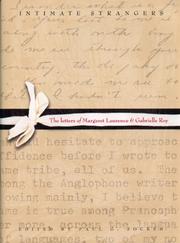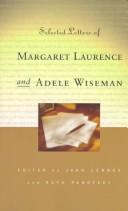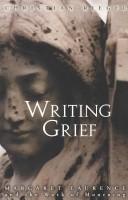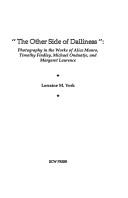| Listing 1 - 10 of 10 |
Sort by
|
Book
ISBN: 0771092318 9780771092312 Year: 1976 Volume: 131 Publisher: Toronto, Ont : McClelland and Stewart,
Abstract | Keywords | Export | Availability | Bookmark
 Loading...
Loading...Choose an application
- Reference Manager
- EndNote
- RefWorks (Direct export to RefWorks)
Laurence, Margaret --- Laurence, Margaret. --- Laurence, Jean Margaret Wemyss, --- Laurence, Margaret, --- Critique et interprétation.

ISBN: 1283090783 9786613090782 0887553303 0887551777 9780887551772 9780887553301 9781283090780 6613090786 Year: 2004 Publisher: Winnipeg, Man. : University of Manitoba Press,
Abstract | Keywords | Export | Availability | Bookmark
 Loading...
Loading...Choose an application
- Reference Manager
- EndNote
- RefWorks (Direct export to RefWorks)
The books of Margaret Laurence and Gabrielle Roy are among the most beloved in Canadian literature. In 1976, when both were at the height of their careers, they began a seven-year written correspondence. Laurence had just published her widely acclaimed The Diviners, for which she won her second Governor-General's Award, and Roy had returned to the centre of the literary stage with a series of books that many critics now consider her richest and most mature works. Although both women had been born and raised in Manitoba - Laurence in Neepawa and Roy in St. Boniface - they met only once, in 1978 at a conference in Calgary. As these letters reveal, their prairie background created a common understanding of place and culture that bridged the differences of age and language. Here Laurence and Roy discuss everything from their own and each other's writing, to Canadian politics, housekeeping, publishing, and their love of nature. With a thoughtful introduction by Paul G. Socken, these lovely and intimate letters record the moving, affectionate friendship between two remarkable women.
Laurence, Margaret, --- Roy, Gabrielle, --- Carbotte, Gabrielle Roy, --- Laurence, Jean Margaret --- Wemys, Jean Margaret --- Wemyss, Jean Margaret
Book
ISBN: 1443896721 9781443896726 9781443890922 Year: 2016 Publisher: Newcastle upon Tyne, England : Cambridge Scholars Publishing,
Abstract | Keywords | Export | Availability | Bookmark
 Loading...
Loading...Choose an application
- Reference Manager
- EndNote
- RefWorks (Direct export to RefWorks)
Laurence, Margaret --- Laurence, Jean Margaret --- Laurence, Margaret, --- Wemys, Jean Margaret --- Wemyss, Jean Margaret --- Criticism and interpretation.

ISBN: 0802042473 0802080901 1442623179 1442655739 Year: 1997 Publisher: Toronto ; Buffalo : University of Toronto Press,
Abstract | Keywords | Export | Availability | Bookmark
 Loading...
Loading...Choose an application
- Reference Manager
- EndNote
- RefWorks (Direct export to RefWorks)
The correspondence between Margaret Laurence and Adele Wiseman covers a period of 40 years, from 1947-1986, and encompasses the professional and personal developments, accomplishments, disappointments, and satisfactions of that period.
Women authors, Canadian --- Ecrivaines canadiennes --- Correspondence --- Correspondance --- Laurence, Margaret. --- Wiseman, Adele. --- Authors, Canadian --- Laurence, Margaret --- Wiseman, Adele --- Canadian authors --- Wiseman, Adele, --- Laurence, Jean Margaret --- Laurence, Margaret, --- Wemys, Jean Margaret --- Wemyss, Jean Margaret

ISBN: 0887556736 9780887556739 9780887553974 0887553974 1283091437 9786613091437 Year: 2003 Publisher: Winnipeg, Manitoba : University of Manitoba Press,
Abstract | Keywords | Export | Availability | Bookmark
 Loading...
Loading...Choose an application
- Reference Manager
- EndNote
- RefWorks (Direct export to RefWorks)
Margaret Laurence's much admired Manawaka fiction - The Stone Angel, A Jest of God, The Fire-Dwellers, A Bird in the House, and The Diviners – has achieved remarkable recognition for its compassionate portrayal of the attempt to find meaning and peace in ordinary life. In Writing Grief, Christian Riegel argues that the protagonists in these books achieve resolution through acts of mourning, placing this fiction within the larger tradition of writing that explores the nuances and strategies of mourning. Riegel's analysis alludes to sociological and literary antecedants of the study of mourning, including the tradition of elegy, from Derrida and Lacan to Freud, van Gennep, and Milton. The "work" of mourning is necessary to move from a state of emotional paralysis to one of acceptance and active engagement. Laurence's characters "perform the work of mourning . returning over and over again to the key issues relating to loss," and, as Riegel's close examination of the texts suggests, are changed thereafter fundamentally and significantly. As an important study of one aspect of Laurence's oeuvre, Writing Grief not only illustrates how Laurence's own preoccupations with mourning are figured, but also how different ways of working through grief result in renewed potential for consolation and connection, and "a renewed definition of self."
820 "19" LAURENCE, MARGARET --- #KOHU:CANADIANA 2003 --- 820 "19" LAURENCE, MARGARET Engelse literatuur--20e eeuw. Periode 1900-1999--LAURENCE, MARGARET --- Engelse literatuur--20e eeuw. Periode 1900-1999--LAURENCE, MARGARET --- Grief in literature. --- Laurence, Margaret --- Laurence, Margaret, --- Laurence, Jean Margaret --- Wemys, Jean Margaret --- Wemyss, Jean Margaret --- Criticism and interpretation.
Book
ISBN: 9401209170 9789401209175 9789042036499 9042036494 Year: 2013 Publisher: Amsterdam : Rodopi,
Abstract | Keywords | Export | Availability | Bookmark
 Loading...
Loading...Choose an application
- Reference Manager
- EndNote
- RefWorks (Direct export to RefWorks)
This book examines the literary construction of personal identity through autobiographical narratives by three significant writers analysed together for the first time: the Scottish Willa Muir (1890-1970), the Canadian Margaret Laurence (1926-1987), and the New Zealander Janet Frame (1924-2004). These apparently dissimilar authors suffered not only geographical, but also political marginality: they were women from the working-class or struggling middle-class, striving to be considered as professional writers, and emerging from countries that might be felt to be under the shadows of economic and political world powers such as England and the United States. During their lifetimes, they exerted themselves to overcome prejudices about class, gender and ethnicity. They experienced war and the post-war era, and lived through most of the twentieth century, being accurate witnesses and critics of their times. As it discusses major writers who are iconic for the development of the literatures of their respective countries, this book also attracts readers who are interested in learning more about the lives of these remarkable women, the way their socio-historical and geographical circumstances affected their writing and how they expressed such concerns in their autobiographies and other fictional and non-fictional works, besides considering them in relation to contemporary women writers —and autobiographers— who underwent similar experiences.
Autobiography --- Autobiography of women --- Women's autobiography --- Women authors. --- Muir, Willa, --- Frame, Janet. --- Laurence, Margaret. --- Anderson, Willa, --- Muir, W. J. A. --- Muir, Wilhelmina Johnstone, --- Laurence, Jean Margaret --- Laurence, Margaret, --- Wemys, Jean Margaret --- Wemyss, Jean Margaret --- Clutha, Janet Paterson Frame --- Scott, Agness Neill --- Criticism and interpretation. --- Autobiographies --- Women authors --- 法蘭姆珍奈 --- Frame, Janet
Book
ISBN: 0773411216 9780773411210 9780773426221 0773426221 Year: 2012 Publisher: Lewiston : The Edwin Mellen Press,
Abstract | Keywords | Export | Availability | Bookmark
 Loading...
Loading...Choose an application
- Reference Manager
- EndNote
- RefWorks (Direct export to RefWorks)
This book discusses how national identity is depicted among Female Canadian authors in the mid to late twentieth century. It shows the traversal of realism and idealism, ethnicity, gender, and the construction of community in several novels. She argues that most critics emphasize the romance aspects of the novels, particularly because these are women authors, and ignore or overlook the realist dimensions to the stories. Doing this often creates a certain stereotype about women authors, and female identity, that poses issues related to one's national identity. While in the 1960's-80's it was no
Atwood, Margaret, 1939- -- Criticism and interpretation. --- Engel, Marian -- Criticism and interpretation. --- Laurence, Margaret -- Criticism and interpretation. --- Women and literature -- Canada -- History -- 20th century. --- Women and literature --- English --- Languages & Literatures --- English Literature --- History --- Laurence, Margaret --- Atwood, Margaret, --- Engel, Marian --- Criticism and interpretation. --- Passmore, Marian --- Atwood, Margaret Eleanor --- Atwood, Margaret --- Ėtvud, Margaret, --- Atvuda, Mārgareta, --- Etvuda, Mārgareta, --- Laurence, Jean Margaret --- Laurence, Margaret, --- Wemys, Jean Margaret --- Wemyss, Jean Margaret
Book
ISBN: 1772123935 9781772123937 9781772123944 9781772123951 9781772123357 Year: 2018 Publisher: Alberta : The University of Alberta Press,
Abstract | Keywords | Export | Availability | Bookmark
 Loading...
Loading...Choose an application
- Reference Manager
- EndNote
- RefWorks (Direct export to RefWorks)
"Margaret Laurence and Jack McClelland-one of Canada's most beloved writers and one of Canada's most significant publishers-enjoyed an unusual rapport. In this collection of annotated letters, readers gain rare insight into the private side of these literary icons. Their correspondence reveals a professional relationship that evolved into deep friendship over a period of enormous cultural change. Both were committed to the idea of Canadian writing; in a very real sense, their mutual and separate work helped bring "Canadian Literature" into being. With its insider's view of the book business from the late 1950s to the mid-1980s, Margaret Laurence and Jack McClelland, Letters presents a valuable piece of Canadian literary history curated and annotated by Davis and Morra. This is essential reading for all those interested in Canada's literary culture."--
Novelists, Canadian --- Publishers and publishing --- Book publishing --- Books --- Book industries and trade --- Booksellers and bookselling --- Canadian novelists --- Publishing --- Laurence, Margaret --- McClelland, Jack, --- McClelland, John Gordon, --- Laurence, Jean Margaret --- Laurence, Margaret, --- Wemys, Jean Margaret --- Wemyss, Jean Margaret --- 1900-1999 --- Canada. --- Canada (Province) --- Canadae --- Ceanada --- Chanada --- Chanadey --- Dominio del Canad --- Dominion of Canada --- Jianada --- Kʻaenada --- Kanada --- Ḳanadah --- Kanadaja --- Kanadas --- Ḳanade --- Kanado --- Kanak --- Province of Canada --- Republica de Canad --- Yn Chanadey --- Dominio del Canadá --- Kaineḍā --- Kanakā --- Republica de Canadá --- Letters / Canadian Literature.
Book
ISBN: 9781771121484 1771121483 9781771121491 1771121491 9781771121477 1771121475 9781771121460 1771121467 Year: 2017 Publisher: Waterloo, Ontario : Wilfrid Laurier University Press,
Abstract | Keywords | Export | Availability | Bookmark
 Loading...
Loading...Choose an application
- Reference Manager
- EndNote
- RefWorks (Direct export to RefWorks)
Margaret Laurence Writes Africa and Canada is the first book to examine how Laurence addresses decolonization and nation building in 1950s Somalia and Ghana, and 1960s and 1970s English Canada.Focusing on Laurence's published works as well as her unpublished letters not yet discussed by critics, the book articulates how Laurence and her characters are poised between African colonies of occupation during decolonization and the settler-colony of English Canada during the implementation of Canadian multiculturalism. Laurence's Canadian characters are often divided subjects who are not quite members of their ancestral "imperial" cultures, yet also not truly "native" to their nation. Margaret Laurence Writes Africa and Canada shows how Laurence and her characters negotiate complex tensions between "self" and "nation," and argues that Laurence's African and Canadian writing demonstrates a divided Canadian subject who holds significant implications for both the individual and the country of Canada.Bringing together Laurence's writing about Africa and Canada, Davis offers a unique contribution to the study of Canadian literature. The book is an original interpretation of Laurence's work and reveals how she displaces the simple notion that Canada is a sum total of different cultures and conceives Canada as a mosaic that is in flux and constituted through continually changing social relations.
Decolonization in literature. --- National characteristics, African, in literature. --- Laurence, Margaret --- Laurence, Jean Margaret --- Laurence, Margaret, --- Wemys, Jean Margaret --- Wemyss, Jean Margaret --- Criticism and interpretation. --- Africa --- Canada --- In literature. --- Canada as postcolonial. --- Canadian literature. --- Canadian nationalism. --- Margaret Laurence's African writing. --- Margaret Laurence's Canadian writing. --- Margaret Laurence. --- Western Canadian literature. --- decolonization in Canada. --- decolonization. --- divided subject in Canadian writing. --- prairie literature. --- settler-colony history in Canada.

ISBN: 1550220020 1550220039 Year: 1988 Publisher: Toronto, Ont. : ECW Press,
Abstract | Keywords | Export | Availability | Bookmark
 Loading...
Loading...Choose an application
- Reference Manager
- EndNote
- RefWorks (Direct export to RefWorks)
Canadian literature --- Literature and photography --- Littérature canadienne --- History and criticism --- Histoire et critique --- Findley, Timothy --- Laurence, Margaret --- Munro, Alice --- Ondaatje, Michael, --- Criticism and interpretation --- #KOHU:CANADIANA --- 82:7 --- 820 <71> --- Literatuur en kunst --- Engelse literatuur--Canada --- 820 <71> Engelse literatuur--Canada --- 82:7 Literatuur en kunst --- Littérature canadienne --- Photography and literature --- Photography --- Munro, Alice, --- Ondaatje, Philip Michael, --- Laidlaw, Alice Ann, --- מאנרו, אליס, --- מונרו, אליס, --- Laurence, Jean Margaret --- Wemys, Jean Margaret --- Findli, Timoti --- Финдли, Тимоти --- Criticism and interpretation. --- Munro, Alice Ann Laidlaw, --- Laurence, Margaret, --- Findley, Timothy, --- Findley, Timothy Irving, --- Ondaatje, Philip Michael --- Ondaatje, Michael --- Ondaatje, Philip Michael --- Wemyss, Jean Margaret
| Listing 1 - 10 of 10 |
Sort by
|

 Search
Search Feedback
Feedback About UniCat
About UniCat  Help
Help News
News